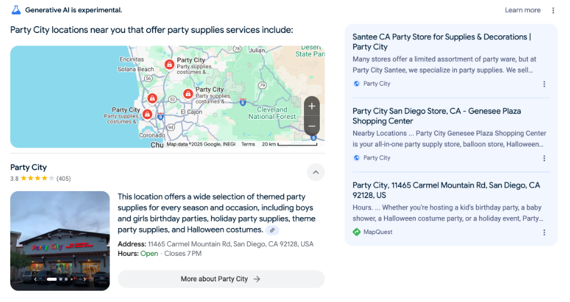Structured data might sound like a technical term, but it’s actually a powerful tool that can help your local business shine online. Imagine it as a behind-the-scenes assistant that makes your business stand out in search results. It adds eye-catching features like star ratings, FAQs, photos, and even buttons that encourage people to click and learn more about your business.
In this guide, we’ll break down everything you need to know about structured data and how it can boost your local SEO. Whether you’re running a small bakery, a hardware store, or a local service business, this guide will help you understand how to use structured data to get noticed more often and attract more customers.

List of Contents
What is Structured Data?
Structured data is a way to organize and label the information on your website so that search engines like Google can understand it better. It’s like giving search engines a cheat sheet about your business—what you do, where you’re located, your hours, and even what customers are saying about you.
The most common way to add structured data to your website is by using Schema.org, a universal vocabulary that search engines recognize. By adding Schema markup to your site, you’re telling search engines exactly what your business is all about.
Why Does Structured Data Matter?
You might be wondering, “Why should I bother with structured data?” Here’s why:
- It Makes Your Listings Stand Out: Structured data can add rich results to your search listings—like star ratings, photos, or buttons—that make your business more appealing.
- It Helps Search Engines Understand Your Business: By providing clear, organized information, you make it easier for search engines to show your business to the right people.
- It Boosts Click-Through Rates (CTR): When your listing looks more attractive and informative, people are more likely to click on it.
- It’s Great for Voice Search: As more people use voice assistants like Siri or Alexa, structured data helps your business show up in voice search results.
- It Gives You a Competitive Edge: If your competitors aren’t using structured data, you’ll have a clear advantage in search results.
Key Terms to Know
Before we dive deeper, let’s clarify some important terms:
- Structured Data: A format for organizing information on your website so search engines can understand it better.
- Schema: A set of tags (or markup) you can add to your website to describe your business. Schema.org is the most widely used vocabulary for this.
- Rich Results: Enhanced search listings that include extra information, like photos, reviews, or buttons.
- SERP Features: Special elements on search engine results pages (SERPs), like maps, featured snippets, or local packs.
How Structured Data Helps Local Businesses
Structured data is especially important for local businesses because it helps you highlight key details that customers care about. Here’s how it can work for you:
1. Showcase Your Business Information
With structured data, you can display important details like:
- Your business name, address, and phone number.
- Your hours of operation (including holiday hours).
- Customer reviews and star ratings.
- A map with directions to your location.
For example, a local coffee shop can use structured data to show its star ratings, a “Place an Order” button, and its hours right in the search results. This makes it easy for customers to find what they need without even clicking on the website.
2. Highlight Special Offers and Events
If you’re running a promotion or hosting an event, structured data can help you showcase it in search results. For instance:
- A bookstore can highlight an upcoming author signing event.
- A restaurant can promote a seasonal menu or discount.
3. Build Trust with Customer Reviews
Adding review schema to your website allows your star ratings to appear in search results. This builds trust and encourages more people to click on your listing.
4. Improve Voice Search Visibility
As voice search becomes more popular, structured data helps your business show up in voice search results. For example, if someone asks, “Where’s the best pizza place near me?” structured data ensures your business is part of the answer.
How Structured Data Works with Google Business Profile

Your Google Business Profile (GBP) is a key part of your local SEO strategy. While structured data doesn’t directly affect your GBP ranking, it complements it by ensuring your website and GBP listing are consistent and accurate.
For example, if your GBP listing has your address and hours, adding the same information to your website using structured data helps Google connect the dots. This makes your business look more trustworthy and reliable.
Structured Data and AI Tools
AI tools like ChatGPT, Google Assistant, and Bing Chat are changing the way people search for information. Structured data plays a big role here because it helps these tools understand and display your business details accurately.
For example:
- If someone asks, “What time does Joe’s Diner open?” structured data ensures the AI tool can pull the correct hours from your website.
- If your site has FAQ schema, AI can use it to answer common questions about your business.
This means structured data isn’t just for traditional search engines—it’s also essential for staying visible in AI-powered search environments.
How to Add Structured Data to Your Website
Ready to get started? Here’s a step-by-step guide to adding structured data to your website:
Step 1: Choose the Right Schema Category
Schema.org offers specific categories for different types of businesses. For example:
- Use
schema.org/IceCreamShopfor an ice cream parlor. - Use
schema.org/LocalBusinessfor a general local business.
If you can’t find a specific category for your business, use the general LocalBusiness schema.
Step 2: Add Required Information
Every schema type has required properties. For a local business, these typically include:
- Name: Your business name.
- Address: Your physical address.
- Phone Number: Your contact number.
- Hours of Operation: Your opening and closing hours.
- Image: A photo of your business (like your storefront).
Step 3: Add Recommended Information
To make your listing even better, consider adding:
- Customer Reviews: Display star ratings and reviews.
- FAQs: Answer common questions about your business.
- Map Link: Add a link to your location on Google Maps.
- Price Range: Indicate your pricing (e.g., “$$” for moderate pricing).
Step 4: Validate Your Structured Data
Before you go live, use tools like Google’s Rich Results Test or the Schema Markup Validator to check for errors. These tools will tell you if your structured data is set up correctly and eligible for rich results.
Step 5: Monitor Your Results
Once your structured data is live, keep an eye on how it’s performing. Use tools like Google Search Console to track your rich results and see how they’re impacting your traffic and clicks.
Common Mistakes to Avoid
While adding structured data is relatively straightforward, there are a few pitfalls to watch out for:
- Incomplete Information: Make sure all required fields are filled out.
- Incorrect Schema: Use the right schema type for your business.
- Validation Errors: Always test your structured data to ensure it’s error-free.
- Outdated Information: Keep your details (like hours or address) up to date.
Real-Life Examples of Structured Data in Action
Let’s look at how structured data can work for different types of businesses:
1. A Local Bakery
A bakery can use structured data to display:
- Star ratings and customer reviews.
- A “Place an Order” button.
- Seasonal specials or promotions.
2. A Hardware Store
A hardware store can highlight:
- Its address and hours.
- A map with directions.
- Upcoming workshops or events.
3. A Home Repair Service
A repair service can showcase:
- Customer testimonials.
- Service areas (e.g., “Serving all of San Diego”).
- Links to book an appointment.
The Future of Structured Data and Local SEO
As search engines and AI tools continue to evolve, structured data will only become more important. It’s not just about ranking higher—it’s about making your business more visible, trustworthy, and appealing to potential customers.
By investing time in adding structured data to your website, you’re setting your business up for long-term success in local search.
Key Takeaways
- Structured data helps search engines and AI tools understand your business.
- It makes your search listings more attractive and informative.
- Use tools like Google’s Rich Results Test to validate your structured data.
- Start with basics like your name, address, and hours, then add extras like reviews or FAQs.
By following these steps, you’ll make your business more visible and appealing online—and that means more customers finding you!



